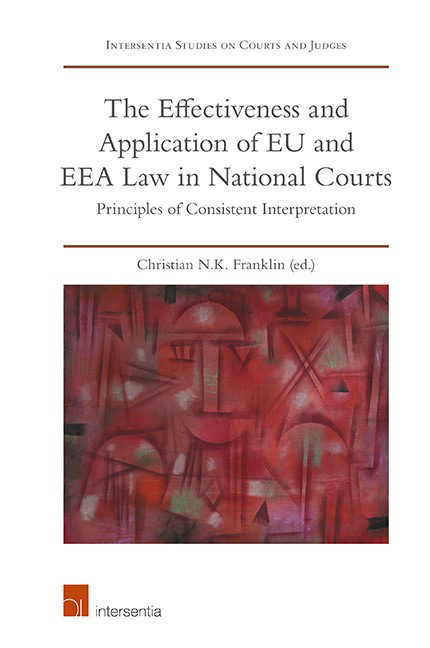 The Effectiveness and Application of EU and EEA Law in National Courts
The Effectiveness and Application of EU and EEA Law in National Courts Denmark
Published online by Cambridge University Press: 31 January 2019
Summary
INTRODUCTION
This contribution will look at EU-consistent interpretation in Denmark. It is structured as follows: in section 2, a thorough background on the Danish legal system is provided; in section 3, the methodology applied in the more empirical part of the contribution is accounted for; in section 4, national case-law on EU-consistent interpretation, where no preliminary reference has been made, is analysed, with a special focus on the issue of limits to consistent interpretation; in section 5, the Danish courts ‘ use of the preliminary reference procedure is described and preliminary rulings on questions from Danish courts concerning consistent interpretation are discussed in detail; and section 6 rounds offwith a set of conclusions.
THE DANISH LEGAL SYSTEM
Denmark, Greenland, and the Faroe Islands constitute the Kingdom of Denmark, which has a total population of approximately 5.8 million inhabitants. The first Danish Constitution from 1241 was the Jyske Lov (Law of the Jutes), and laid down the principle that no one must judge contrary to the law which was issued by the king and adopted by the people.
The chosen king and the nobles jointly held the formal power in government affairs in an aristocracy. In 1660 and 1665, King Frederik III changed the Danish legal system to absolute monarchy through the – Lex Regia (King ‘ s Act). Lex Regia was the legal foundation of jura majestatis (the king ‘ s power).
This regime lasted until the Danish Constitution was adopted in 1849. The King ‘ s Act was a constitutional act and is the only written constitution for an autocratic regime in Europe. As a direct result of the absolute monarchy in 1660, King Christian V initiated the national unification of law implementing the absolute monarchy in the substantive law, accomplished in 1683 by Danske Lov (the Danish Code) of King Christian V. Important principles of the Danish Code are still in force, for example fundamental rules of the law of contract and principles of liability for damages.
The Danish Grundloven (Constitution) of 1849 abolished the absolute monarchy and made Denmark a constitutional monarchy in accordance with Section 3 of the Constitution. The Constitution has been amended three times since 1849.
- Type
- Chapter
- Information
- The Effectiveness and Application of EU and EEA Law in National CourtsPrinciples of Consistent Interpretation, pp. 257 - 290Publisher: IntersentiaPrint publication year: 2018


